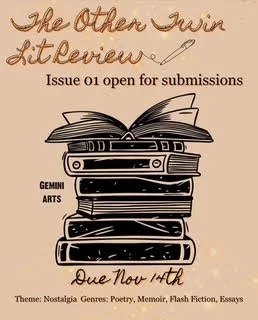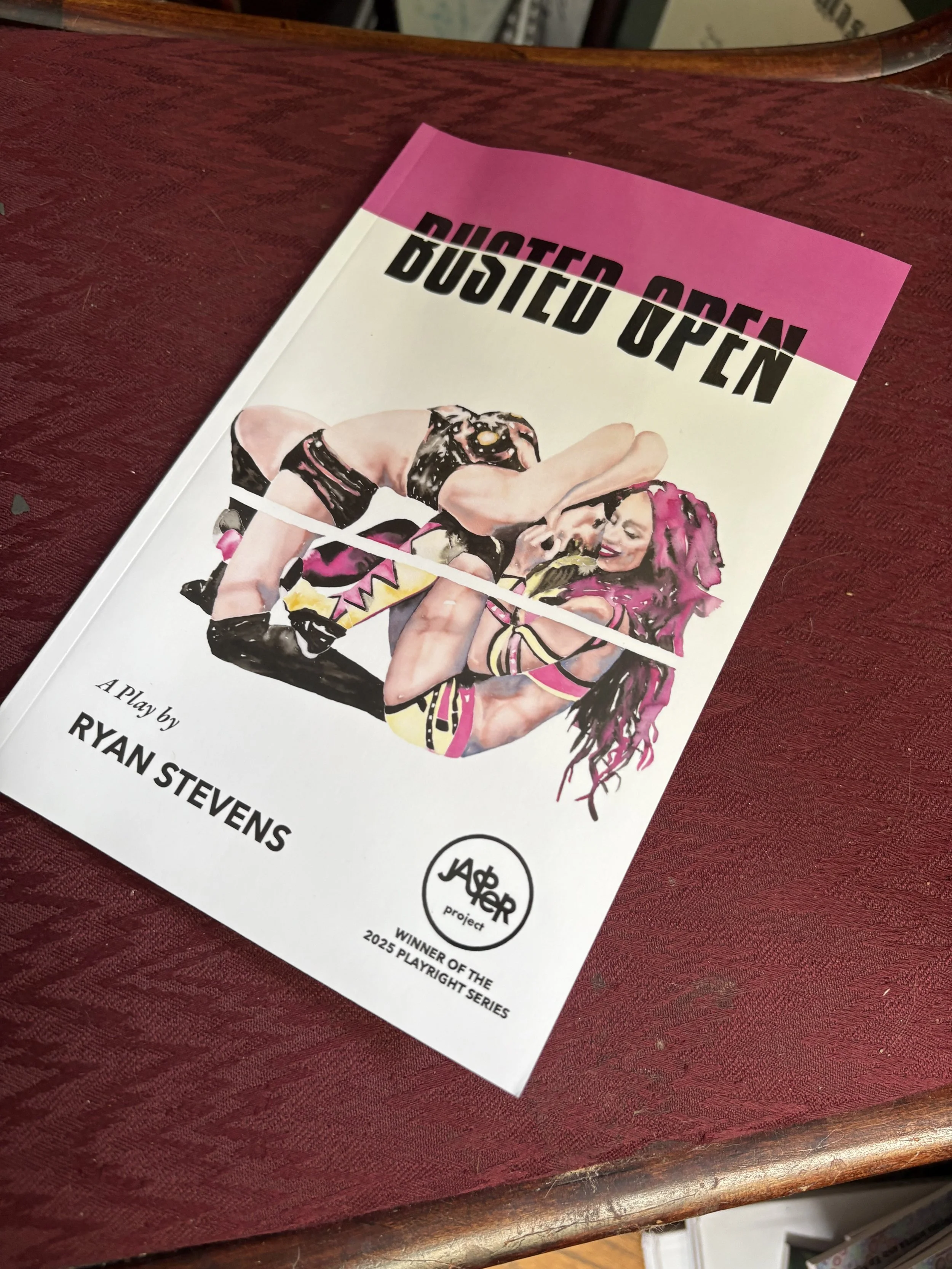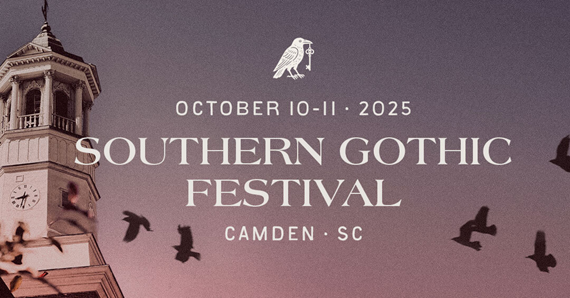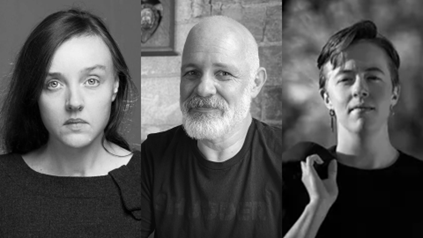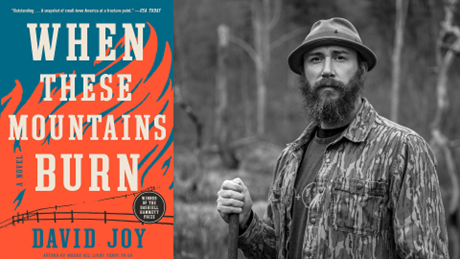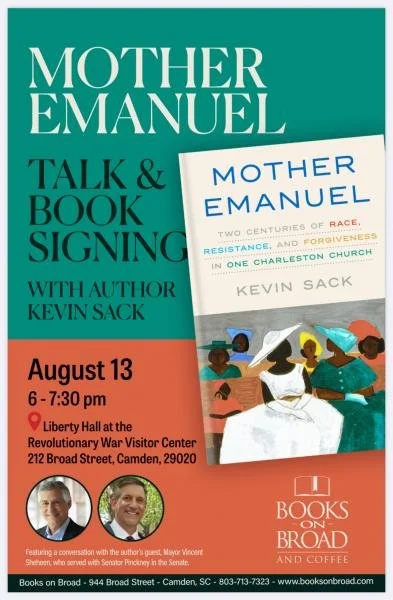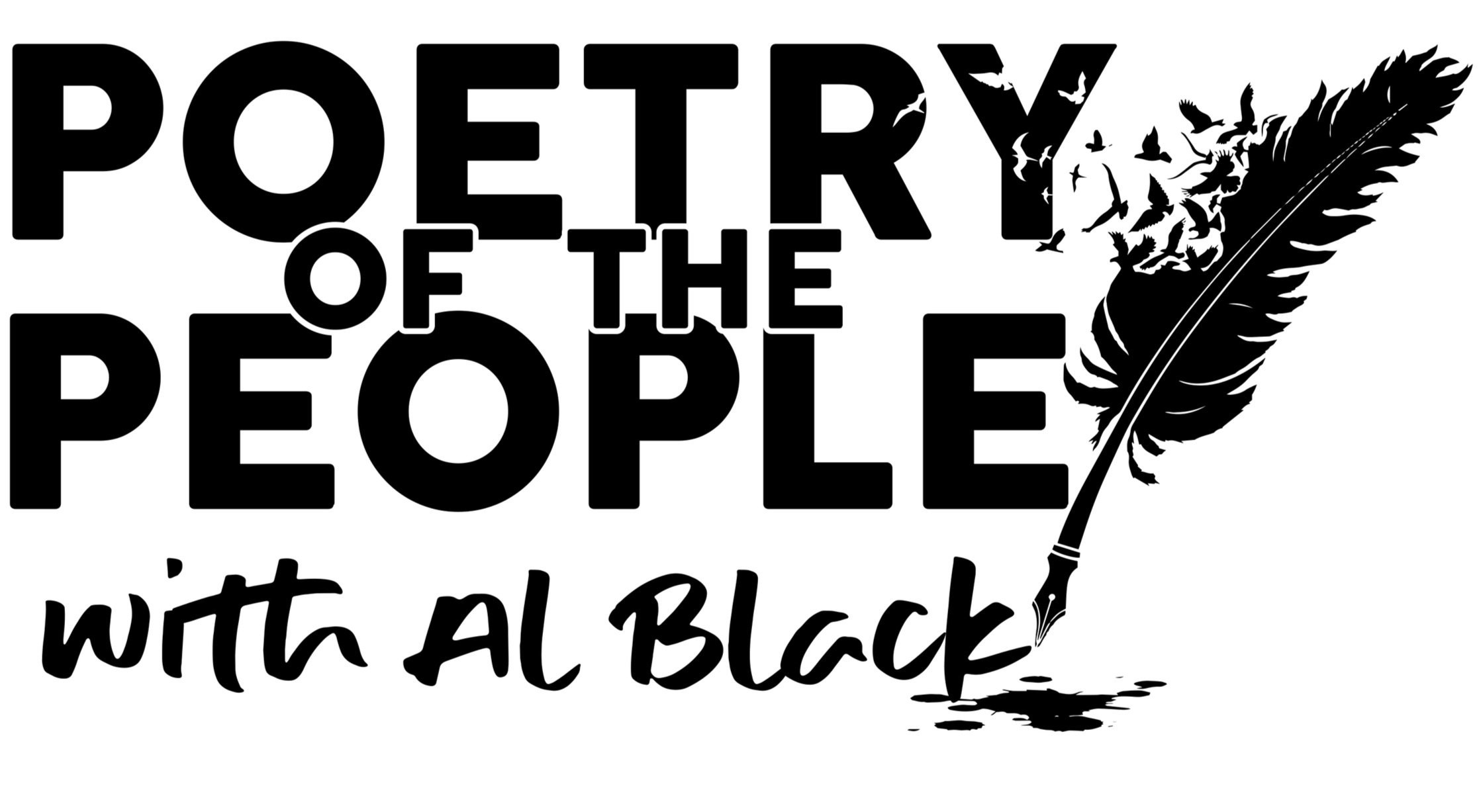This week's Poet of the People is Amanda Rachelle Warren. I met Amanda about ten years ago when she appeared at Poems: Bones of the Spirit with her poet, colleague/partner in life, Roy Seeger. She is a delightful and engaging read and an even better listen. She and her husband were recently included in Southern Voices 2024/25, Fifty Contemporary Poets.
-Al Black
Amanda Rachelle Warren's work has appeared in Tusculum Review, The Carolina Quarterly, Appalachian Heritage, Anderbo, and the Beloit Poetry Journal as well as other journals. Their chapbook Ritual no.3: For the Exorcism of Ghosts, was published by Stepping Stone Press in 2010. They are the 2017 recipient of the Nickens Poetry Fellowship from the South Carolina Academy of Authors. Their first full-length collection, Rituals for to Call Down Light, was published by Finishing Line Press in Spring 2024. They teach at the University of South Carolina Aiken.
____
Solus
1.
Rain knocks pollen from the air.
Everywhere it hits: an o of yellow neon.
Everywhere it runs: a spot of clean smooth, nothing.
2.
Nothing wakes me.
Not the warning sirens,
not the loud rumble, not the flash
of light outside the window.
The rain dampens everything with a soft hush.
I dream of water. Of the open window,
drops swelling the wood in its sash,
wrapped tight in my pink comforter,
the rain hits my upturned face,
and I pray the way a child prays,
though I know how pain cuts the self into paper dolls.
The light through the window does not wake me.
I am shielded by rain.
3.
In this dream I am crying.
In this dream I am always crying.
What never happened will keep
never happening.
4.
I am tired. The rain does not stop.
I want to sit in the closet and cover myself in wool sweaters.
I want to wash and dry everything in the house.
I want a cup of tea, so I make one.
5.
He and I are, he and I are. A dirty lie.
He and I. The window cracked to let the rain in.
Drops pattern the left shoulder of my jacket;
fall with the weight of blossoms.
The rain makes me want to smoke.
Everything looks so clean. I want to
dirty it up. Smack it around a bit.
I drive. I gnash my teeth at the car in front of me.
Move motherfucker. Jesus Christ.
The smoke tastes like a bad idea. I want more.
I put my palm up to the sky, lick the pool that gathers there.
Angle my wrist. Roll my eyes and pray,
loving the syllables of submission.
Lord, I will do anything. Anything
you want Lord, anything. I will do anything:
I am stretched thin
I am not in a forgiving mood.
Something is coming for me, scratches towards me,
rain seeps through it, threatens,
wants me emptied, ready to fill again.
Tenure Track Appointment
By the time I print the directions to who knows where, they're already memorized. I've overlayed the map on the overlay of my brain. I've run through the turns and gauged whether I or Google know better.
I know better. But today I've nowhere to go. I wait. There's something I should probably be doing, but what is it? Someone tell me.
It is Tuesday and my husband is divesting the blueberry bush of its blossoms. It stands there in naked glory. If we pinch back the fruit this year the bush will grow fuller. I want to run.
This fall we'll be fruitless. And we'll feed the pecan trees. And we'll see how tall the tea roses he has gentled back from nothing more than a green stub grow. And should we wait on the strawberries too? We ask, and I imagine my teeth full of small seeds. Pick a direction. For fuck's sake.
Next year will be better, tomorrow will be better, has been my motto for so long. I'll just have to work harder. If I just work harder. Then I can rest. Then I can get back to that creek- side flecked with mica so the shore shines in sunlight. Then I can learn more complicated stitches so the scarves I knit for Christmas look less like a desperate attempt to offer something of worth if not value. Then I can figure out what everyone means by self-care. Who has time to put their oxygen mask on? I'm gasping here.
When the first real paycheck of my life arrives, I will buy a shirt not on sale to remind myself that the body exists, that it must be fed in many ways. Ways that are not cookies bought without coupons; save a dollar. Ways that are not just words.
If the inkwell runs dry, we fill the well. We dig deeper into the substrate, look for the water table. Here it's all sand that doesn't hold. Every time my husband mixes good dirt into the raised beds, the trees encroach, and the digging is harder. Some summers the tomato leaves crisp in the hard sun and offer nothing. Sometimes there is blight. Sometimes. Sometimes. Some.
Next year, maybe, I can keep my fucking hands off my fucking face like my mother says to and stop picking. Stop damaging myself because there's nothing wrong: food on the table, internet too. I can stare half-asleep at puppy videos, glut myself on other people's recipes and how-tos--never lift a finger. Next year, I'll paint the risers on the stairs. Each step a lighter blue so it looks like I'm rising with them.
And we'll do something about that railing, right? So many coats of thick cheap paint rounding the edges of good wood. But I haven't even refinished the cabinet I bought last year. I haven't even hung the pictures in the hall because first the hall needs painting and before that we've got to spackle the seams and make decisions. Hopefully not wrong ones. But paint is cheap, my husband says. Whatever decision you make it's fine. And “it's fine” is not meant as apathy. Don't tell me what I mean.
Maybe instead, I'll run...map each road from here to where with a good pen on blank newsprint rolled across the hood of my car like it's already full of someone else’s' directions. Fishcamps. Right of ways. An exclamation point in thin black ink where the cartographer suddenly realized that wayfinding isn't a competition. A circle near Level Church because that's where the local radio station cranked CCR's "Lodi" and where some ghost whispered the lyrics by heart through the speaker's rough crackle.
In two years, the lowest branch on the pecan tree by the front gate we do not use, will touch the hundred-year-old house it took us 20 years to afford.
There's a map to two years from now that I have neither printed nor read. But “the man who plants the date palm…” some wise jackass once said.
Tomorrow, I'll convince myself to stay until the goddamn blueberries arrive. Right now, my hip hurts. Right now, my hair is a mess. Right now, I am afraid to get in the car because I don't know if I'll stop.
In the fall, I will move into my second-floor office and worry about birds throwing themselves suicidally against the windows that do not open, and I will wonder if the smell of my bare feet will carry to the faculty office next door, or should I need a shawl to cover my arms because I've heard the offices are cold, and I am disgusted by the idea of a fucking shawl of all things nesting in my brain.
Already this is changing me. Jesus. What will it mean to not be angry? What will it mean to not humble myself before myself? What would it mean to think I somehow earned something? I hope I don't know. I hope I never know. And that this doesn’t mean that this right here is as good as it gets.
The Dead are the Worst
Oily coffee from the gas station because
why not stay up all night?
The dead rattle on while I try to sleep,
so I rise, pick a road, ride it out, I guess.
Rain makes the sodium lights hiss like a directive:
Shut your mouth. Danger. Drink up. Remember.
The root of vulnerable is wound.
Suicides are speaking from the tree line.
Something haunts my oil pan.
I keep the radio low.
So the dead don’t surprise me.
So I can still write them off as interference.
The laughter of one gone brother leaves trails on my eyelids
like the trail of reflectors in the side view.
His memory is scar like the road is scar. How?
Like the car is hot metal, machine. Facts.
Brake dust darkens the seam of his pockets. Wait.
The dead lie through the tinny speakers. Below the wah-wah.
Tonight, one is explaining the afterlife as matter-of-fact
as baseball plays beneath the chorus. How I’m
stuck in the middle with you.
This car feels like a church in disrepair.
The chorus likes to point out
the things I already know. Jokers to the right.
I drive to the top of the ridge to make things clearer and fail.
I try to find some direction in the mid-station static,
where the dead hiss and crackle their EVP. I find
one word: Sincere. Piercing, and loud. Then, Stupid.
Well, fuck you too.
I’m down to a quarter tank.
The moon is completely gone.
Which of the dead is saying Break a leg, boys?
Which is just repeating sorry?
One of them slips his foot on the gas beside mine,
in a voice all slick with temptation says:
We could really make this sucker fly.
Brother, You Don’t Even Know
In his wallet, he carried
a stack of business cards: coal black, no
text, no nothing, on either side. We
in our confusion, passed
them between us, forgetting
momentarily, that Uncle Hugo is
what we quaintly call "gone."
We will try to ignore the symbolism
of cards that convey nothing
found in the pocket of our dearly
departed. Dear Gertie holds
the cards to the light
expecting some meaning to shine
through the coal black dark.
Cousin Ansel wonders silently if
this is all a consequence of war,
some trauma never pinned to language.
Shake before using,
read the poison bottle
Uncle Hugo slit
his throat with.
The note in his pocket,
jammed beneath
dusty peppermints, read:
forget the cognac, I didn’t think
this was a kindergarten.
Uncle Hugo would have
rather died like a wind-chime,
clunk-clunk, in the linden tree
which grows nothing but shade,
but someone, perhaps Darling Frieda,
perhaps Little Hannah, returned
the step ladder to the shed and for once
locked it.
Nothing is ever where it should be.
Except, perhaps, Uncle Hugo
sprawled casual and cold in the pantry
in his good brown suit.
Blood congealing around the jars
of blueberry jam Great Aunt Delilah-Jean
so patiently canned wishing some small
summer sweetness spooned, come winter,
over her award-winning buttermilk biscuits.
Paul will grab the mop.
When the sweet, baby-headed
undertaker comes to lift
Hugo's stiffening body,
Hugo’s false teeth will clatter
to the ground and never be found.
Hugo, a tough nut, never cracked
a smile once he, what we quaintly call "returned,"
from the war, which he never did.
He told Aoife once that his dreams
were filled with jam-thick blood.
He told Aoife that once, when Aoife was small.
He never smiled. But we hope
he’ll have gold teeth in heaven to do so.
After Die Brücke (1959)
No Peach Pie in Barstow
On Coolwater Lane my phone goes dead. Over 3,000 miles
on a single charge because I don’t talk much that way.
I just want to sink into the small kidney-shaped pool
at the Motel 8 and wash the day from me. Five fights
in fifty miles, my co-pilot finding fault in everything:
sky, mountains, other drivers, douchebags from Havasu
hauling jet skis and trophy wives, the places we stop,
the places we don’t, the distance left to go.
The pool is closed, chained tight. It is sunset—
yellow ball of sun sinking behind the Pinos,
behind the Tehachapi, on the other side of Mojave. She
goes to bed, sprawls and scowls.
I lean on the aluminum fencing looking towards Calico,
where I would go were I alone. I wonder how far
I could get without her noticing
that I am really, truly gone.
There is a glass bottle of peach Nehi rolling in the floorboard
where it has been rolling for nine days. Picked up from a
peach pie stand on the Ace Basin Parkway in South Carolina.
I have brought it this far. And there’s not a peach pie in sight
anymore. Not a one. For the first time, I miss my actual, physical home.
I unbraid my hair, bleached by the sun so light in spots it is like gold, release
shed strands to the hot wind along the National Road,
proof I was here wishing it were beautiful.
On the Way to Needville
I drive to the coast and stare at the gulf for a while.
From the granite outcrop, that stays the wear of tide,
I see the edge of something which is not a horizon.
Behind me oil derricks pump the past up, burn it away.
Beyond the breakers, platforms rise like small angry cities.
I am a small, angry city unto myself. Small and angry
and staring at the grey water like it isn’t a foreign body.
I am thinking how this is not the body I would build for myself.
But one that feels the speed of the earth I am cemented to.
I get in the car. This is pointless. I’m thinking
I could drive for days with no one passing me. I wouldn’t
even have to say my name aloud to myself. If I didn’t want it.
There’s nothing but endless Texas fences fencing nothing but scrub.
It is pointless, the way I move toward homesickness,
writing “I should have taken you with me” on postcards
addressed to some old self. We need to stop lying
about being comfortable when nothing fits this skin of skin
that holds us to the whiplash ground. The lean trees grow
twisted in the salt wind, they grow twisted in the flatlands,
they grow twisted in the deep imaginary woods I imagine I came from.
We could be anywhere and not belong. We could be everywhere.
And road burnt we’ll always find our way here, or somewhere the same.
Miles to Badaxe
Everyone in Birkenstocks, no one in moccasins.
The weather is unseasonably warm.
Corpses of fish flies heap in the sills.
Lake birds preen their fat bellies.
Everyone dusting the calcium chloride from their blue jeans
and reaching for the cooler between this town,
and that town, and that corner bar,
and party store and grab another cold one
because the green of the fields and the green
of the trees is flying by like too much goddamn green.
And the green mile markers tick higher, northing,
with the green names of German street signs
and the green moss on that Bavarian-gabled wreck
of a ruin of a house on North. And there’s the green water,
and the green shore of Canada, and the green of your shirt,
and “someone must really like green” the realtor said once
to my husband's German father who is chopping
back green branches in his green pants and green
shirt and green socks and Birkenstocks,
and I’m just glad the axe is dull, so he won’t chop off his toes.


